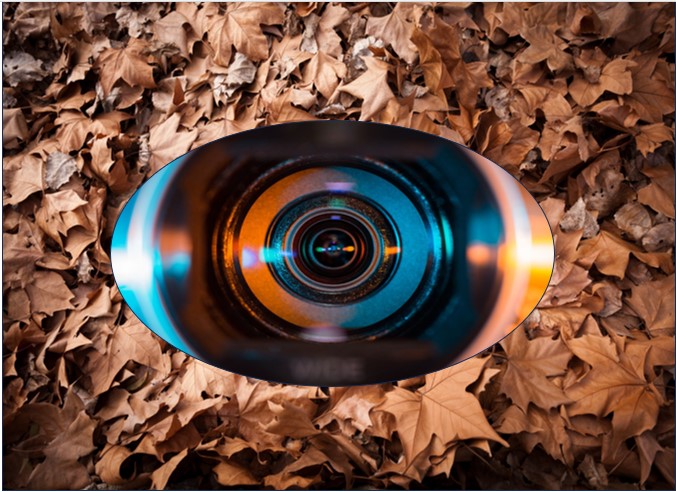
(Images from Shutterstock)
“You are under surveillance,” intones a disembodied voice.
I look up, startled. My scalp tingles with honest sweat, and the sun warms my shoulders as I sling last fall’s leaves and broken tree limbs into a compost pile at the park.
“You are under surveillance,” the voice repeats, its intonations flat. The pitch is low, stereotypically male, but both tinny and spooky, like the controller of an alien spaceship.
This park is the opposite of extraterrestrial. Its hills and lakes have been a refuge for me since we moved to Waterloo. The long trail for extra-good dog walks; the woodsy, hidden trail the Boy Scouts carved down to the creek; the lake for kayaking; the community dog park that saved my sanity during COVID lockdown….
But now I am under surveillance.
I get it, I really do. People who are “not from home,” as Waterlooians describe the rest of the world, use the park to dump their unwanted yard waste. Professional landscapers haul in huge loads. And a shrugging “More compost for us!” is not fair to the folks who have to wrangle all that detritus, grinding a tangle of branches into mulch for our gardens.
Still, the taped loop feels eerie. As though a giant eyeball has spotted me in a shady corner of the world and turned its full glare upon me. Is no place safe? I want to grumble—which is ironic, given that all this surveillance is ostensibly in place to keep us safe. Protected from interlopers and theft, from furtive violence. Sometimes it even works, not so much to prevent but after the fact, to ID or help convict. But is there surveillance to protect us from surveillance? Prevent bodycam footage from being faked, or Ring cameras from getting hijacked, or, the most chilling prospect, Elon Musk’s “fully implanted, cosmetically invisible” Neuralink from getting hacked while it is inside our brains?
Every tool has its dangers.
I miss the old, more obviously flawed but deeply human forms of surveillance. The busybodies who kept a wise eye on everything that happened on their street. The staunch citizens who might have a quick word with the police chief over coffee, if they saw some illegal dumping. Big orange-lettered BLOCK HOME signs in the window that promised kids ready help. Neighbors. Here, everybody knows everybody already, so that human network was pretty damned efficient.
Still, a small police force does not have time to patrol the compost heap. I do not want to be one of those people who resist small changes that make life easier for those who look out for us. And this tiny safeguard should mean nothing, in a world in which advances in brain science are making it possible to read our minds and translate our thoughts, and a handful of states are already proposing laws to protect neural privacy. But that sort of invasion feels remote, here in the park, and—“You are under surveillance.” The loop has begun again, just as I reached for plastic yard-waste bags in the trash bin. Frugal and filled with environmental angst, I cannot stand to see them used once and discarded, pristine save a few leaf crumbs or grass clippings.
“They’re in the trash,” I snap at the Voice. “This is not stealing. And I live here.”
When we lived in a big city, everybody was scared to interfere. We mainly stayed inside our homes, eyes fixed on our screens. And screens were fixed on us, daring us to run a red light or trespass or say or do anything we would not want blasted all over the internet.
Here, in this small cheerful town, it has felt different. Kids are not umbilically tied to their phones. Gossip thrives. People get outside, chat, trade favors, worry about one another. I forgot all about issues of privacy and surveillance. Forgot I used to defend the need for it, teasing, “Unless you’re committing crimes, why do you care what they see?”
Now I feel like a criminal. Even though “they” is only a nice official and the film, if it even exists, is probably dumped without viewing.
Maybe tech will bring us full circle. AI will take our jobs and more of us will be home and we will get bored with our screens and come outside. Once we get used to living as a community, we will also remember How fun it was to compare notes on crazy new vegetables or a great sale with a grocery cashier instead of beeping our own stuff into a bag. How much easier it was to get excited about learning when you had a wildly enthusiastic professor beaming at you instead of a Zoom course. How pleasant it used to be to call a number and explain our problem to a human being who could instantly connect us with the right person, rather than sweat through bad music, maddening flowcharts in which none of the numerical options are quite right, and bots who “did not understand” and send us back into the infinite jest of the digital loop.
Old people are such fun when they are cranky. Soon I will be reminding you that I walked three miles to school and used to play outside till dark. But the thing is, we have lost something. Kids have lost the freedom of roaming the neighborhood, gauging the sunset, inventing adventures. I have lost the ability to dump a trug of leaves without being Under Surveillance. Which, because I grew up Catholic, makes me feel instantly, irrationally guilty. I rev the Mini and zoom away, muttering “Fuck you” under my breath.
The only thing sillier than this spat with a machine would be to stop feeling anything at all. Stop interacting, take all the tech for granted, go numb. Forget what freedom felt like.
Read more by Jeannette Cooperman here.
